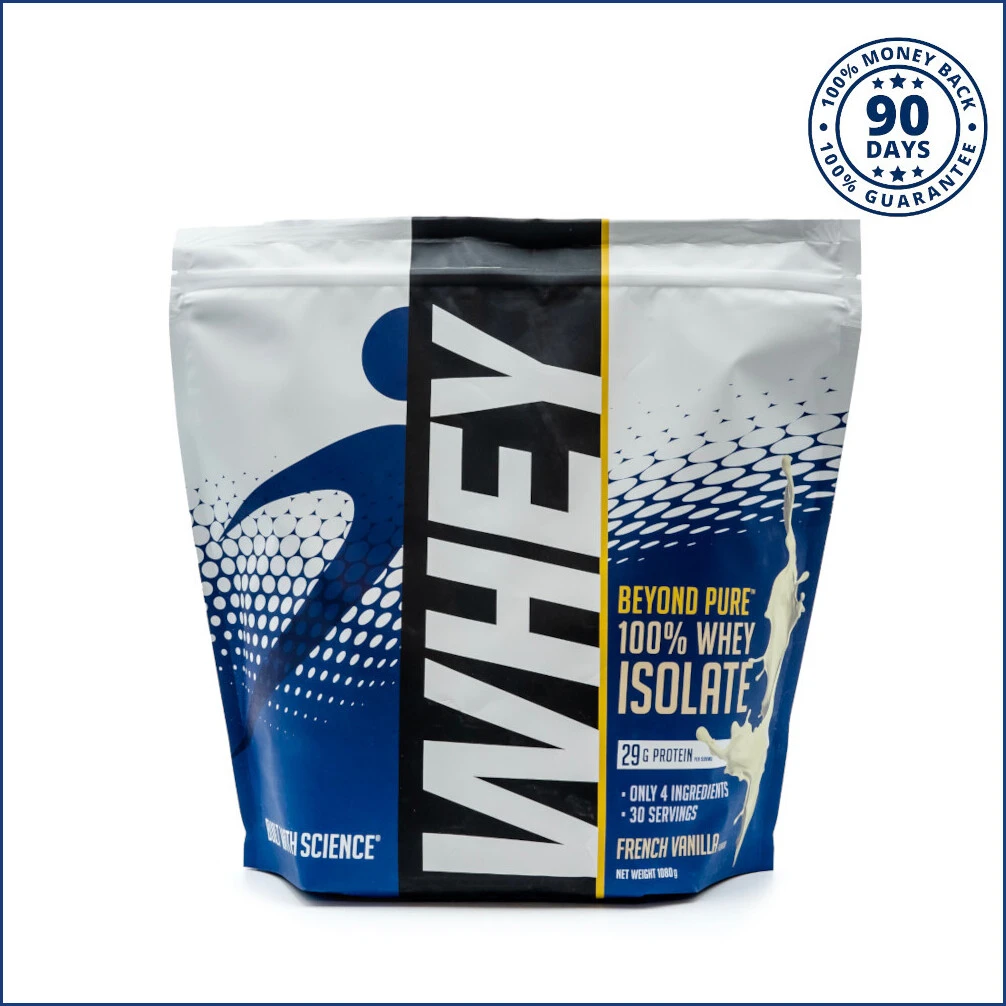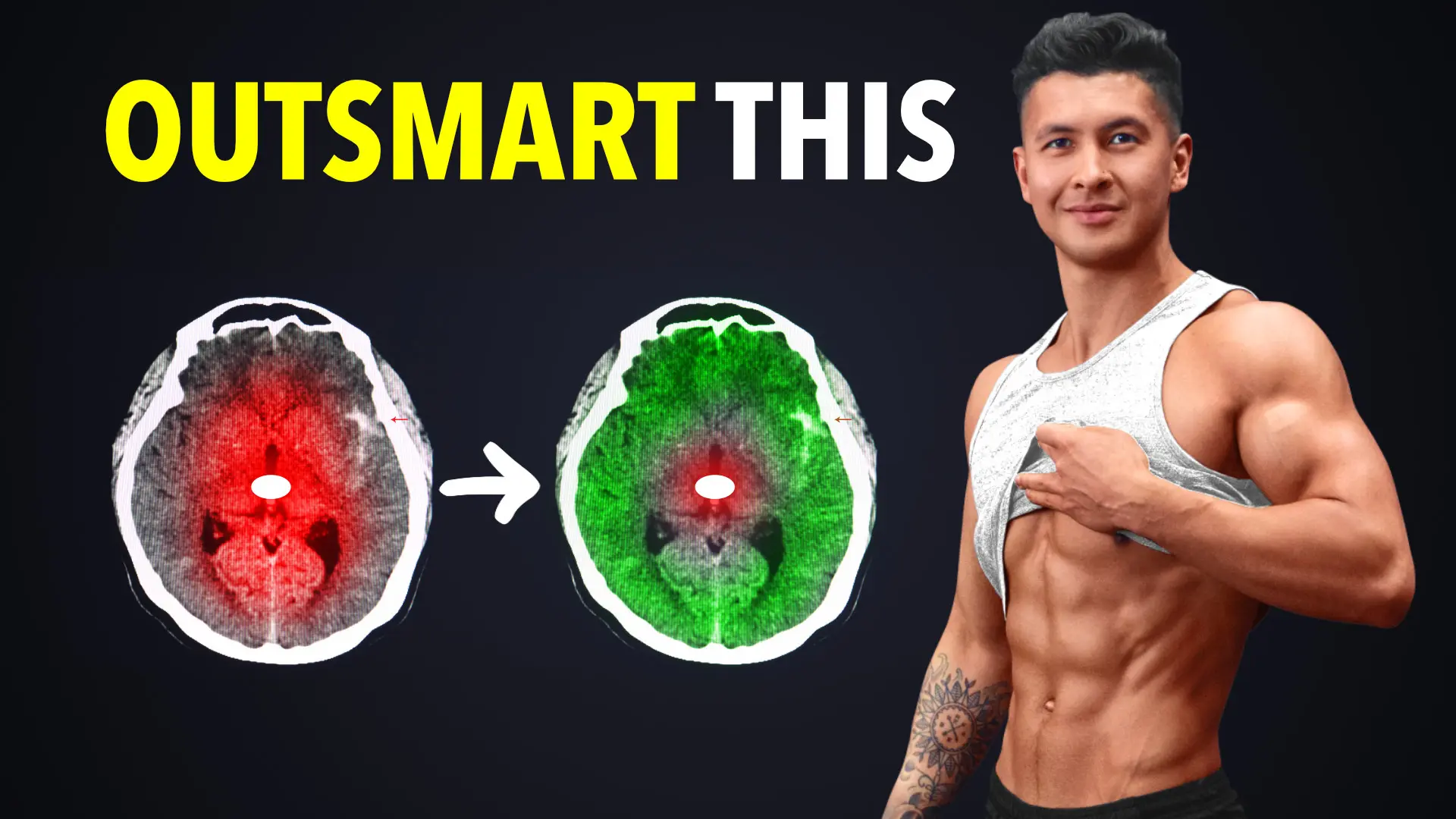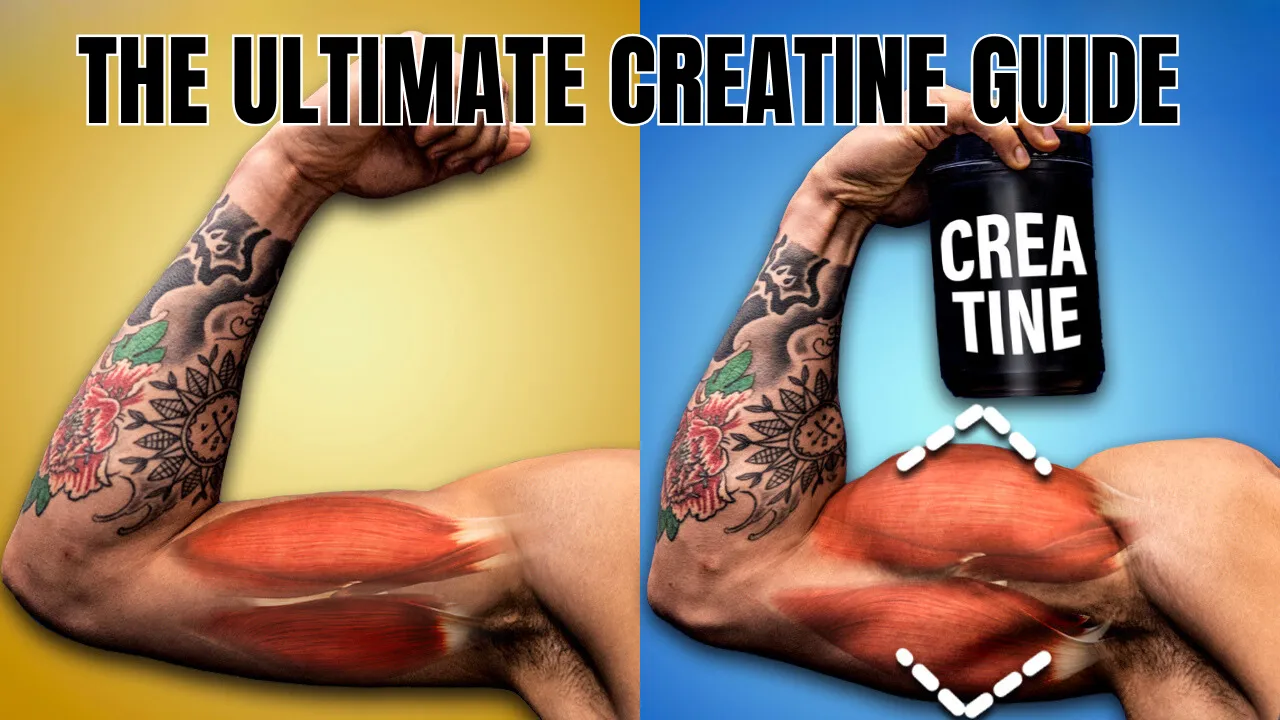
Creatine Benefits, Side Effects, And More (The Ultimate Science-Based Creatine Guide)
The ultimate creatine benefits guide. Learn what creatine is, how it does what it does, and the potential side effects you may need to brace yourself for.
Primary researcher for this article: Daniel Plotkin, PhD student
Creatine benefits: makes you bigger, faster, and stronger.
This is something we've all heard — but have you ever wondered about the history of creatine? Like, who was the lucky person to have discovered creatine and its benefits on our muscle size, strength, and athletic performance?
Also, how does creatine even work in the first place? And more questions: given such an impressive list of creatine benefits, there must be a catch, right? What are we missing?
Well, good news. You'll find all (or most) of the answers you're seeking in this article. Here, I'll explore:
- How we came to know of creatine benefits (I'll keep the history portion brief, I promise)
- The role creatine plays in energy production and how that helps with your #gains
- Creatine pros and cons
- ... and more
Creatine Benefits: Who Discovered Them?
Let's travel back in time. All the way to 1835.
Because that was when a French scientist, Michel-Eugéne Chevreul, first extracted it from meat. But, fascinatingly, that wasn't when creatine became well-known.
Instead, creatine only became popular much later — in the 20th century, after its first reported use by British track and field athletes during the 1992 Summer Olympic Games in Barcelona (understandably, because creatine benefits = bigger, stronger, and faster).
And it's rumored that creatine's growth in popularity has a linear relationship with the number of gym-bros, then later exercise scientists, due to their fascination with the mechanisms of creatine.
Well, OK, so it isn't so much a rumor as a joke ... but deep down, I suspect there's a kernel of truth within.
What Is Creatine?
OK, but before we cover creatine benefits, we need to talk about what creatine, one of the longest and most well-studied sports supplements on the market, actually is.
It's a naturally occurring, nonessential (note: your body synthesizes it in your liver), organic, nitrogen-containing compound made up of 3 amino acids:
- Arginine
- Glycine
- Methionine
At least 95% of the body’s creatine is stored in skeletal muscle.
And speaking of ... let's now take a look at creatine's primary function in muscle: energy production.
Creatine's Role In Energy Production
To understand creatine benefits (e.g., athletic performance enhancement), it is important to be somewhat familiar with how the human body creates energy.
Or, put in a slightly nerdier way, adenosine triphosphate (ATP) — the organic compound that provides energy to drive and support many processes in your body, such as digestion and muscle contraction.
Now, the human body produces ATP via 3 distinct pathways:
- ATP-phosphocreatine system
- Glycolysis
- Oxidative phosphorylation
Without overwhelming, boring, or turning you off with the specifics, I'll draw an analogy to help you better understand creatine's role in ATP production.
So, remember those days when you needed physical cash to buy stuff? Or maybe you're still using cash? Either way, it doesn't matter. You can think of your muscle as your wallet; it contains readily spendable money — ATP/energy — you can use when trying to make a quick purchase.
Creatine, on the other hand, functions more like a backpack or purse.
It's like a form of "back-up cash". When your muscles run low on ATP, your body would call on those creatine stores to "donate" a phosphate group that quickly converts adenosine-diphosphate (i.e., 2 phosphate groups) into adenosine triphosphate (i.e., 3 phosphate groups) to replenish your muscles' energy supply.
Understanding How All That Ties Back To Creatine Benefits
OK, so what does all that have to do with creatine benefits?
In short, when you do low-intensity activities, your body is able to still rely on your readily available ATP to sustain your efforts.
But the moment you do high-intensity activity (e.g., sprinting or repping out a set of 10 hard bench presses), your body quickly runs out of "spendable" ATP, and that's when it asks for additional phosphate group from creatine phosphate to "restore" your energy supply.
Increase Muscle Size And Strength
And ... what does have to do with bigger muscle size and increased strength?
Well, creatine supplementation increases the amount of creatine in your muscles (saturating your stores), essentially giving your body access to all the "backup" energy it could possibly make use of. This means you'll be able to get just a bit more out of each set you do.
In fact, increased strength is a well-documented finding on the list of creatine benefits.
Studies generally show about a 10% increase in strength or reps completed. This can translate to ~1 to 2 extra reps on a given set.
Of course, this might not seem like much. But that little bit can snowball over time, meaning you can expect to see noticeable gains in your future by just doing a teeny weeny bit more every training session.
Beyond simply giving your body access to "backup" energy (so you achieve a higher training volume, and higher training volume equals more gains — up to a point), researchers also believe that creatine may stimulate muscle growth through other mechanisms, such as by influencing the section of hormones, like insulin-like growth factor 1 (IGF-1).
Additional Creatine Benefits
So. Bigger, stronger, faster. Is that all there is to creatine benefits? What if your mom, dad, or random friend would like to take it, and they aren't all that into the fitness side of things? Could creatine be good for them?
The truth is that creatine is involved in a stupendous number of physiological processes.
Given that, naturally, there will be additional creatine benefits beyond the athletic and muscle-building side of things. Of course, the following section is by no means an exhaustive list of all the other creatine benefits there are — but is, instead, simply a primer for anyone interested in whetting their appetite with all the other roles of creatine in physiology and potential clinical use cases.
Since it is a primer, I will not go into any real detail (although you're welcome to deep dive if you'd like).
Sperm, Eye, And Ear Health
Creatine is used to support healthy sperm motility (helpful when they're trying to get through the female reproductive tract and to the egg), photoreceptors in the eyes, and the villi in the inner ear that gives us hearing and balance.
So, basically, with no creatine, Hector would be as Achilles predicted him to be, traversing the underworld deaf, dumb, and blind.
Neuromuscular Diseases
A number of studies have investigated the short- and long-term therapeutic benefits of creatine supplementation in children and adults with various neuromuscular diseases, such as muscular dystrophy, Huntington's disease, Parkinson's, and Lou Gehrig's disease, with variable success.
Cognitive Function
Creatine supplementation has demonstrated efficacy in the reduction of mental fatigue and improvements in certain aspects of cognitive function (in general and after sleep deprivation).
Bone Density
Creatine has also been associated with improving bone health in the elderly.
Admittedly, there doesn't seem to be an effect with low doses and no resistance training — but research suggests that's likely to change with higher doses and the implementation of an appropriate resistance training program.
Creatine Synthesis Deficiencies
Creatine deficiency disorders are rare, inborn errors of creatine metabolism and transport.
Individuals with creatine synthesis deficiencies have low levels of creatine and phosphocreatine in their muscles, brain, and other tissues.
As a result, they often have clinical manifestations of muscle myopathies, atrophy of certain brain areas, movement disorders, speaking disorders, autism, hyperactivity syndromes, epilepsy, and certain developmental abnormalities.
A number of studies have investigated the use of relatively high doses of creatine monohydrate throughout the lifespan as a means of treatment for children and adults.
These studies are mixed in clinical outcomes.
However, these cases are a good way to show the importance of creatine in human physiology and also support the safety of chronic, high-dose creatine supplementation.
How To Use Creatine
Alright. Now that your understanding of creatine benefits has expanded (by quite a bit, in fact!), it's time to talk about the specifics of taking creatine — e.g., how much, over how many days, and timing.
Creatine Dosage
Typically, you'd get about 1 gram of creatine daily through your normal dietary intake of foods such as red meat and fish.
This level of intake would likely amount to your creatine stores being about 60% to 80% saturated.
You could increase your dietary intake of creatine sources to obtain more — but it would be pretty difficult to ingest creatine at the levels needed to fully saturate your muscles, considering that a pound of uncooked beef or salmon only provides a meager 1 to 2 grams of creatine.
To that end, the most effective way to increase muscle creatine stores would be to take 5 grams of creatine monohydrate 4 times daily (or approximately 0.3 g/kg body weight) for 5 to 7 days.
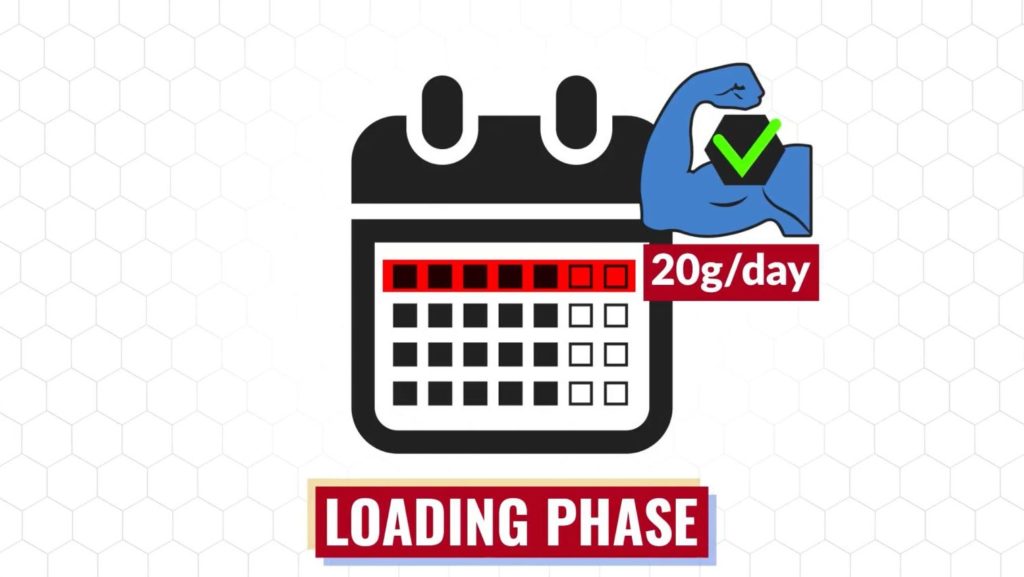
Typically, after a loading regime, a maintenance dose (3 to 5 grams daily) is taken to maintain elevated muscle creatine concentrations.
After loading, you can typically expect to gain anywhere between 2 to 3 pounds (0.9 to 1.4 kilograms) of body mass. Before you freak out, this increase in body weight isn't because you're getting fatter. But instead, it's because creatine helps draw water into your muscles. All that's water weight.
In general, you'd experience anywhere between a 1- to 5-pound increase in body weight. (Once again, don't freak out. You're not "magically" getting fatter.)
Alternative Loading Protocol (Pros And Cons)
If you don't wish to take creatine monohydrate 4 times a day, you could also simply take 3 to 5 grams daily. The pro of this loading protocol is that you wouldn't need to keep reaching out for creatine throughout the day, but the con is that you'd see a gradual increase in muscle creatine content.
You'd take ~28 days to fully saturate your muscles with creatine, compared to the 7 days seen with the more rapid loading protocol.
Of course, this increased time taken to saturate your muscles also means you'll experience fewer creatine benefits (or to a lesser degree) in terms of exercise performance and/or training adaptation — until your creatine stores are fully saturated.
This relatively short amount of time is not a big deal.
However, you should be mindful of the 2 additional downsides to slow saturation:
- You'll take more time to see if you're a responder to creatine (yes, not everyone responds to creatine; more on this in a bit)
- It can cause bigger fluctuations in your weight — which can be especially confusing when you're on a diet
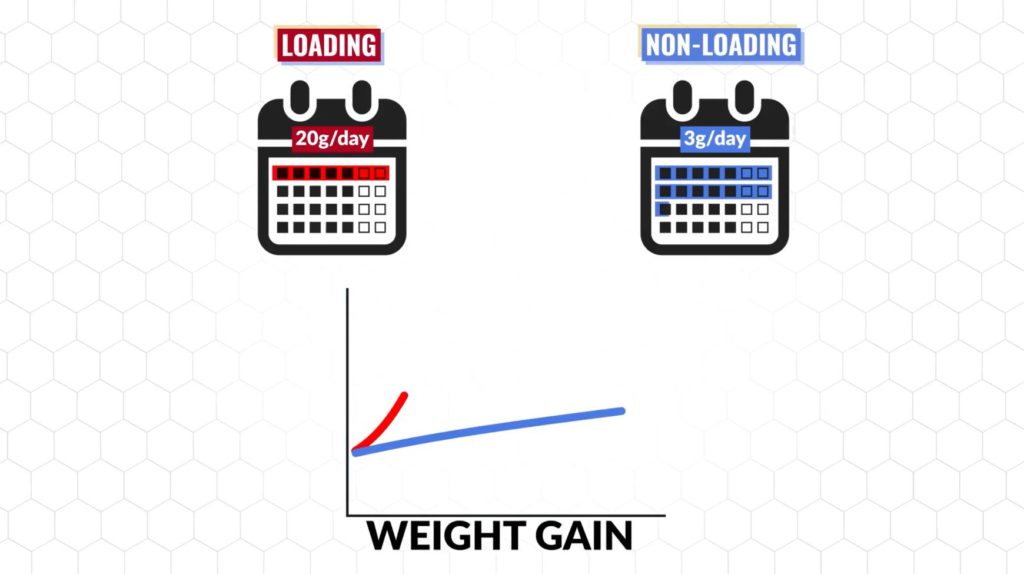
Either way, neither are technically deal breakers, just something to consider on your end.
Creatine Timing
Timing doesn’t really matter. Just take it when it is most convenient for you.
If timing mattered at all, it would likely be during the initial saturation phase, as it's possible taking it after a workout would have a benefit in quicker saturation of stores.
However, it is unlikely to matter on an ongoing basis, and the small benefits you would get from slightly increasing the speed of saturation likely aren’t much.
Creatine FAQs
What Is The Best Type Of Creatine?
There's no reason not to take the most well-tested form: creatine monohydrate.
It's the least expensive and has been shown to be just as or more beneficial than any other form (i.e., you see all the same or more creatine benefits with creatine monohydrate); don't let clever marketing hurt your pocket!
Is Creatine A Steroid?
Yes, creatine benefits are impressive — and that often makes people go, "Wait a minute ... is it a steroid?" That's normal.
But no, I'm here to tell you that creatine is not a steroid.
It does not act like or even remotely resemble a steroid.
Does Creatine Need To Be Cycled?
No, creatine does not need to be cycled.
Taking into account the mechanism of action, it would not make sense to desaturate creatine stores in the muscle. There isn’t any evidence of worse creatine synthesis due to supplementation.
What If I Miss A Day Of Supplementation? (Or Multiple Days?)
When creatine stores in the muscle are saturated, it takes about 4 to 6 weeks for creatine stores to return to baseline if you were to stop supplementation.
So don’t worry if you miss a couple of days or even a week. Just resume the 5 g of supplementation.
If you are worried after, let’s say 2 weeks of not taking it, you can always do 10 g a day for a week to increase.
Do Creatine Benefits Apply To Everyone?
Although creatine supplementation generally results in increased strength, power, and muscle size, there is a variable response.
And that's because some people (estimates are from smaller studies but around ~25%) have naturally high levels of resting creatine in their muscles.
Why? There are 3 reasons; these people:
- Are good at retaining creatine from food or
- Have naturally high levels or
- A combination of both
So, their muscles are either close to or already at full creatine saturation. They're therefore not likely to respond to supplementation.
On the other side of the coin, vegans and vegetarians are particularly susceptible to lower resting levels of creatine and, thus, are prime candidates for supplementation. They'll likely see the biggest creatine before and after results.
Can I Pair Creatine With ...
Caffeine?
Some evidence suggests that chronic caffeine consumption during the creatine-loading phase may blunt the effects of creatine supplementation. While researchers still aren't sure why that's so, possible mechanisms include muscle relaxation time and gastrointestinal distress.
Based on current evidence and an abundance of caution in the name of gains, my suggestion would be to avoid caffeine supplementation not only during creatine loading but also on an ongoing basis.
If you take caffeine before your workouts and you work out in the morning, take creatine at night. And vice versa, easy peasy.
Carbohydrates?
Creatine co-ingested with carbohydrate or carbohydrate and protein increases the amount of creatine retained in the muscle, but this is probably only useful during the loading phase for a quicker saturation of your stores (in 2 to 4 days instead of 5 to 7).
After that, it is unnecessary to pair creatine and carbohydrate.
Creatine Side Effects
Balding And Hair Loss
TBH, all the creatine benefits in the world wouldn't mean anything if taking it made you lose your hair. So, does it? Cause baldness?
Well, there's only been 1 study that hinted at this. And it didn't even measure hair loss directly.
Instead, it measured DHT, a downstream metabolite of testosterone known to contribute to male pattern hair loss.
The study was conducted with 20 healthy young male rugby players who were randomized into:
- A placebo arm
- An intervention arm (participants supplemented with creatine monohydrate by loading 25 g daily for 7 days, then a maintenance dose at 5 g daily for 14 days
The researchers found that DHT was significantly increased at day 7 (by 0.44 ng/mL above baseline, 56.1%) and day 21 (by 0.12 ng/mL above baseline, 40.8%) in the creatine group.
Now, there are a few important things to point out here:
- The creatine group started with very low DHT (lower than the control group)
- Even after the increase, the creatine group's DHT levels were still within the reference range
- This is only 1 study in 1 population (i.e., it might not be generalizable to other populations)
- The changes in testosterone were not significantly different between the 2 groups; the researchers did not measure free testosterone and other relevant metabolites
- It was a short-term study; we do not know what would have happened to DHT if measurements continued
Perhaps even more importantly, DHT production comes from testosterone, and studies don't consistently find an effect on testosterone.
Slightly entertaining is the fact that the same bros that are worried about hair loss are also trying to “boost their test.”
Particularly in those genetically susceptible, higher free testosterone and higher DHT will make balding more likely. If you are worried/susceptible, you should probably consider a hair loss prevention regimen including a DHT blocker which would likely supersede any effect creatine is having.
Also important to note that this would be specific to male pattern hair loss as DHT does not seem to play a role in female alopecia.
I know there was a direct study that was going to look at hair loss specifically, but it got derailed by COVID. Hopefully, that gets up and running soon.
To summarize, we don’t yet know with confidence whether creatine contributes to hair loss, but there definitely is not strong evidence that it does. But if you are very worried, I'd say the creatine benefits may not be worth the heartache and anxiety for you.
Kidney Function
Many people worry about creatine adversely impacting their kidneys. Why?
It all comes down to a compound called creatinine, a breakdown product of creatine phosphate from muscle and protein metabolism. Your body doesn't retain creatinine. Instead, it's removed from the body entirely by the kidneys (via urine).
So, in that sense, elevated creatinine blood levels can be a sign that your kidneys aren't functioning as well as they should — because they're failing to expel the appropriate amounts of creatinine from the body.
Sounds logical. The only problem?
If you increase your consumption of creatine, it's only normal that your creatinine levels would increase. That means creatine supplementation may act as a false indicator of renal dysfunction.
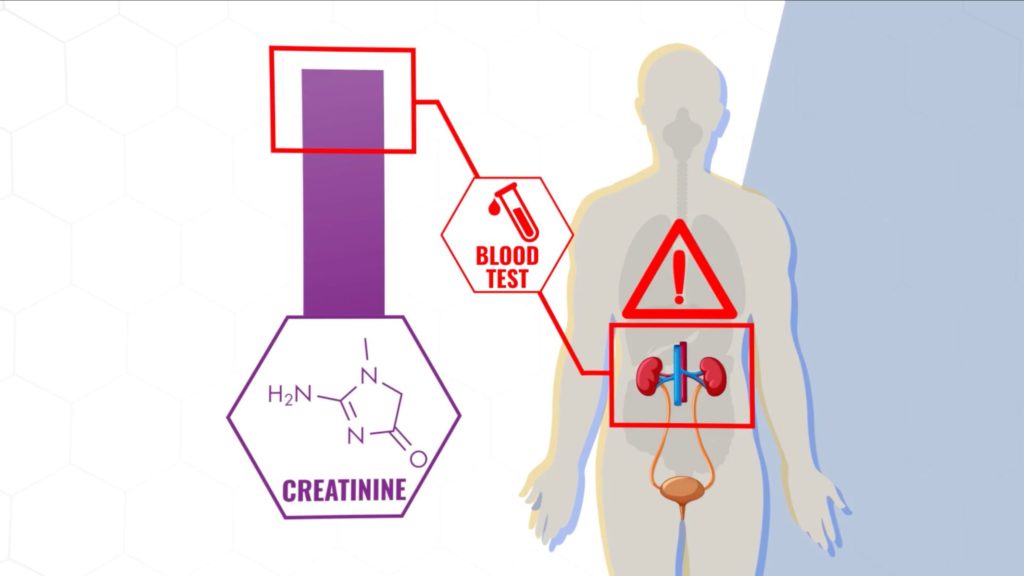
This means you should let your primary healthcare doctor know that you're taking creatine supplementation so they'd conduct additional health screening that accounts for other renal function markers to more accurately determine how well your kidneys are functioning.
Wait. So, creatine supplementation is absolutely alright for the kidneys?
Creatine has an extremely good safety profile including in regard to kidney function.
Thousands of performance studies and billions of doses of recreational creatine use, coupled with long-term, high-dose ingestion of creatine (up to 30 g/d for up to 5 years) in healthy and patient populations (e.g., those with renal insufficiency and end-stage renal disease) with no complications, give us good reason to believe that it is safe for consumption.
Of course, as always, each case should be evaluated independently.
And if you have any form of kidney disease you should consult with a doctor before taking creatine.
Takeaway
Phew. That was a very long article, so let's do a quick summary of everything we've learned about creatine:
- Creatine works by saturating creatine stores in the muscle, allowing for more energy availability for intense events of short duration.
- An effective loading protocol is to ingest 5 g of creatine monohydrate (or approximately 0.3 g/kg body weight) 4 times daily for 5 to 7 days. Typically, after a loading regime, a maintenance (3 to 5 grams per day) dose is ingested to maintain elevated muscle creatine concentrations — and, in turn, creatine benefits.
- Creatine non-responders likely have high baseline creatine concentrations.
- To experience creatine benefits, creatine does not need to be cycled, is not a steroid, and does not have any very notable interactions.
- Creatine has been shown to be safe for all body systems and has not been shown to increase balding.
- Creatine monohydrate provides the same creatine benefits as other forms of creatine (i.e., no reason to take other creatine forms).
- Creatine supplementation may increase creatinine, but this is unrelated to kidney function.
- There may be additional creatine benefits beyond enhancing athletic performance and muscle size — including, but not limited to, improving cognitive functions and bone density.
With all that said, it's important to note that for all the creatine benefits you'll see, it's still not a magical pill that'll help you pack on a ton of muscle or see an impressive increase in strength without working hard in the gym or taking care of your nutrition.
In fact, as I'd previously mentioned in Raza's 30-day creatine transformation article, proper nutrition and hard training will do a lot more for you than taking any supplement will.
And if you’re looking for a step-by-step plan to transform your body as efficiently as possible, just take my quiz below to find the best program for you and your body:
Click the button below to take my analysis quiz to discover the best program for you:
↓
Thanks for sticking till the end, and I'll catch ya next time!

